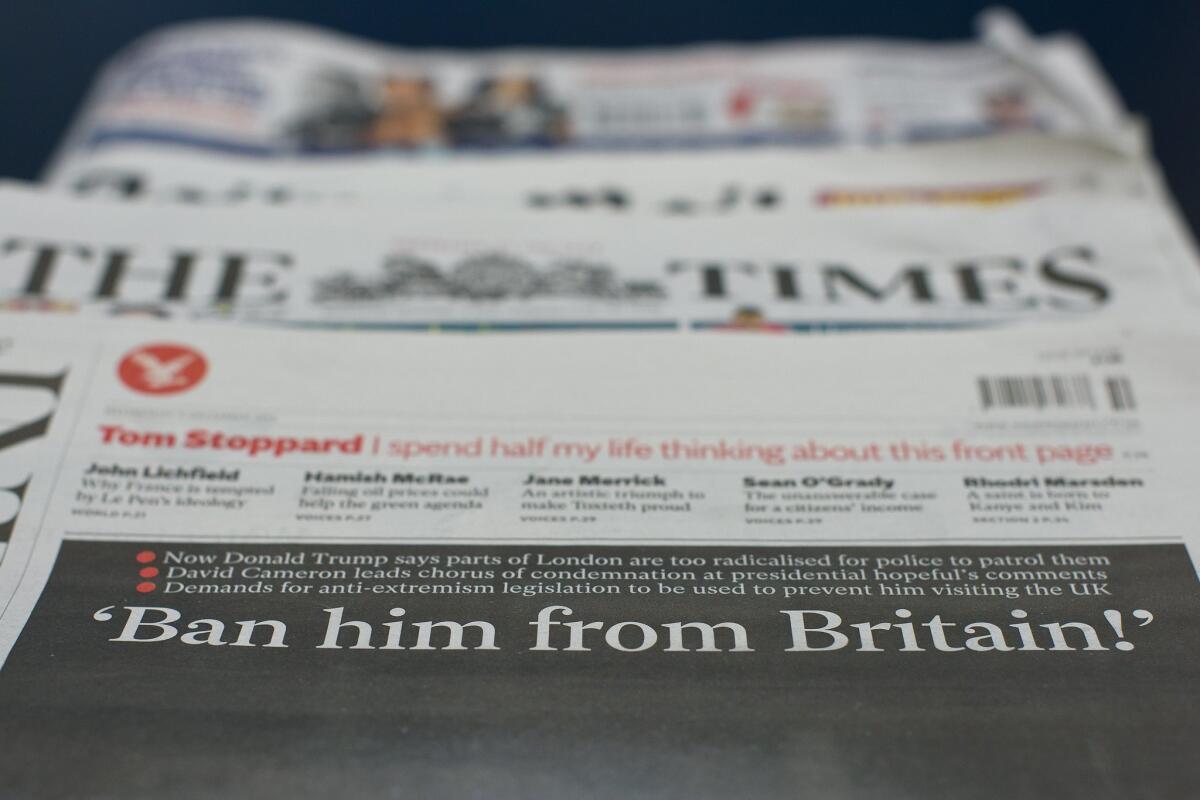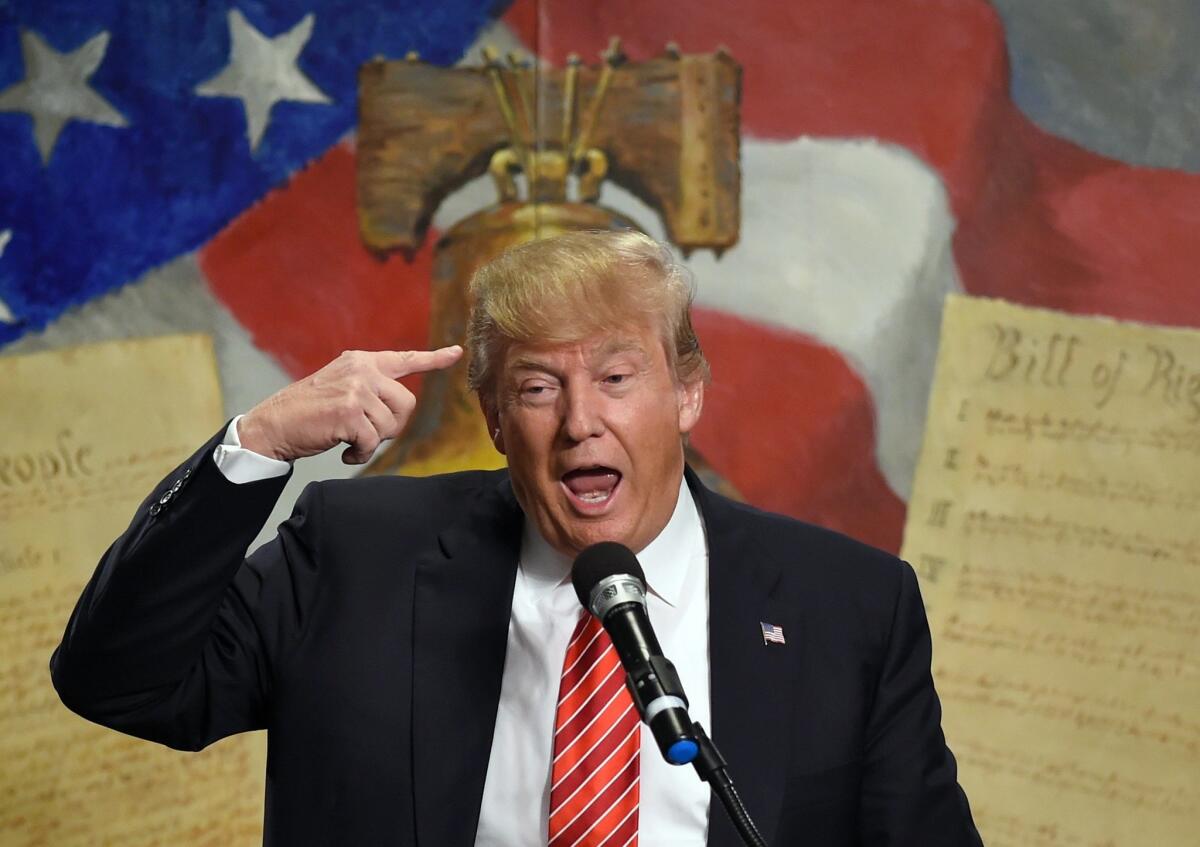Trump called a racist and buffoon as Parliament debates banning him from Britain

Newspaper front pages in London on Dec. 9, after Donald Trump called for a temporary ban on all Muslims entering the United States.
- Share via
Reporting from London — British lawmakers on Monday debated whether Donald Trump should be banned from Britain, after an online petition calling for him to be denied entry for making controversial anti-Muslim comments amassed more than 570,000 votes.
“His words are not comical. His words are not funny. His words are poisonous,” said the Labor Party’s Tulip Siddiq. “They risk inflaming tension between vulnerable communities.”
The unusual and, at times, passionate debate was held in response to the Republican presidential candidate’s statement that all Muslims should be temporarily barred from entering the U.S. in the wake of the shooting in San Bernardino last month that left 14 dead.
Join the conversation on Facebook >>
Trump said there should be a “complete shutdown” of Muslim immigration to the U.S. “until our country’s representatives can figure out what is going on.”
He also later said parts of London and Paris were so radicalized that the city’s police officers were afraid for their lives.

Republican presidential candidate Donald Trump addresses the South Carolina Tea Party Convention in Myrtle Beach, S.C., on Saturday.
The comments caused such uproar in Britain that an online petition quickly gained more than 570,000 signatures, more than any other during the current Parliament.
The debate lasted three hours and took place in a packed Westminster Hall, the secondary debating chamber inside the Houses of Parliament.
There was no vote at its conclusion, and whether to ban Trump could be ultimately decided by the home secretary. But the debate was a rare opportunity for members of Parliament to share their views about the billionaire real estate tycoon-turned-politician and debate U.S. politics.
The debate was led by Labor member Paul Flynn, chairman of the Petitions Committee, who said there was a risk that banning Trump would give him a “halo of victimhood” that would only play into his hands.
“We give him the role of martyrdom, which can seem to be an advantage among those that support him,” the lawmaker warned.
He explained that some argued the matter should not even have come before Parliament, but that it would have been “very difficult to ignore a vox pop that’s so sudden and thunderous and contains the signatures of half a million people.”
“This is the public speaking with a very loud voice indeed,” Flynn added.
TRAIL GUIDE: All the latest news on the 2016 presidential campaign >>
The petition is titled: “Block Donald J Trump from UK entry” and says Britain has banned many individuals for hate speech in the past and that the same criteria “must be fairly applied to the rich as well as the poor, and the weak as well as powerful.”
A counter-petition calling for Trump not to be banned has gathered more than 42,000 signatures.
Trump, whose mother was born in Scotland, owns a golf course there and has threatened to pull out his investments in Britain if he is barred. His company, the Trump Organization, was quoted last month as saying such a ban would “create a dangerous precedent,” and would be a violation of free speech.
During the debate, a six-minute time limit was imposed on speeches because of the number of people who wanted to have their say.
Well-versed arguments for and against were voiced from all sides of the political spectrum.
Some argued Trump’s rhetoric is poisonous and corrosive, and the government should make use of its power to deny entry to people who are considered not “conducive to the public good.”
His entire style of politics is to stoke controversy and say outrageous things. He could conceivably become president of our most important ally.
— Sir Edward Leigh, Conservative member of Parliament
Others said Trump should actually be invited to Britain to see what life is really like.
Trump was called a racist, a misogynist, a homophobe, a fool and a buffoon during the debate, which often felt deeply personal.
“He’s talking about my family, he’s talking about my children, that is what Mr. Trump is taking about,” said the Scottish Nationalist Party lawmaker Tasmina Ahmed-Sheikh, who called the Republican’s views “horrendous.” She supported the ban and said Trump’s statements “condemn a whole region for the actions of a terrorist death cult.”
Home Office Minister for Immigration James Brokenshire ended the debate by saying that Trump’s calls to ban Muslims ignore the fact that Muslims are killed by terrorists more frequently than members of any other religion. He said that anyone who “gives succor to the false view that Muslims cannot live a purposeful and fulfilled life in the West” must be challenged. But despite this divisive rhetoric, he said, Britain deeply values its relationship with the U.S.
Lawmakers who spoke against a ban argued that Trump’s comments were a matter of free speech and that the debate was giving him what he wanted by generating more publicity.
“His entire style of politics is to stoke controversy and say outrageous things,” said Conservative member Sir Edward Leigh. He said a ban could potentially pose bigger diplomatic issues: “He could conceivably become president of our most important ally.”
Conservative member Tom Tugendhat said he thought Trump was “crazy” and had no valid points to make, but that was no reason to ban him. “It is no place of me or this house to criticize a man running for an elected office in a foreign country,” he said. “We may not wish him here, we may not like him here, but we should not vote against his ability to speak.”
Prime Minister David Cameron has made it clear he does not agree with Trump’s remarks, saying they are “divisive, unhelpful and quite simply wrong,” but does not support a complete ban.
Boyle is a special correspondent.
ALSO
Why Marco Rubio and Chris Christie are hoping to place third in Iowa
Too late to stop Trump? As he glides, other candidates fall back in debate
Sharp Clinton-Sanders debate foreshadows primary battles
More to Read
Sign up for Essential California
The most important California stories and recommendations in your inbox every morning.
You may occasionally receive promotional content from the Los Angeles Times.













